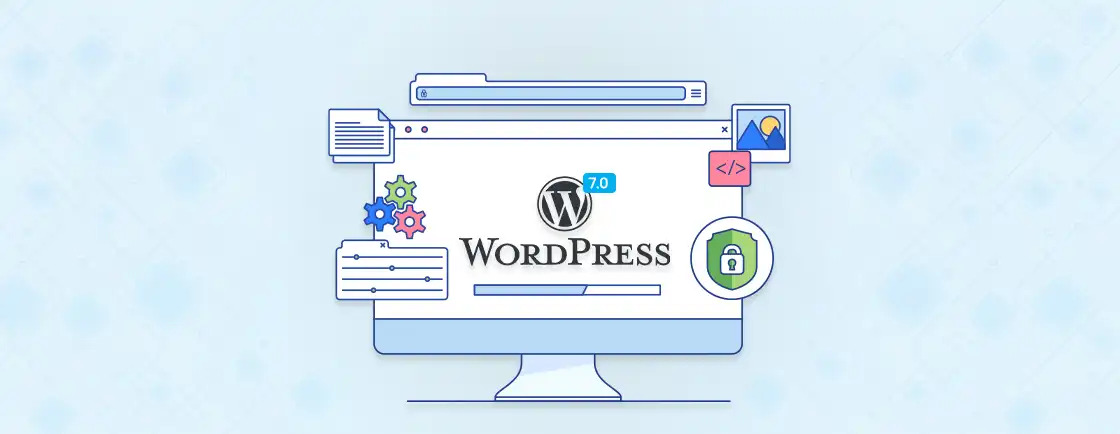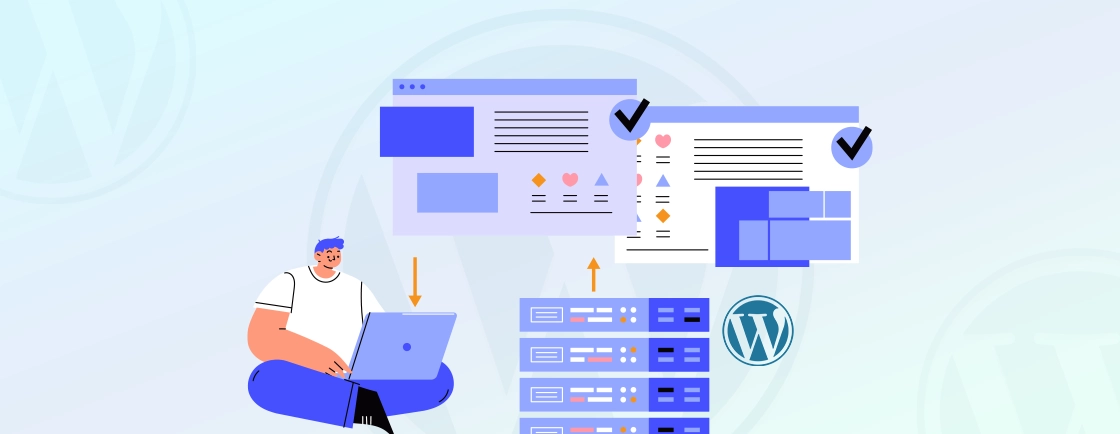Table of Contents
For a majority of the issues that arise in a WordPress site, one of the common solutions adopted by the experts, is updates. The importance of updating WordPress is highlighted in the website’s security and stability, as well as its performance.
WordPress updates bring improvements in three main areas. The core updates from the WordPress team fix bugs, address security issues, and introduce new features. Plugin updates add new features and reinforce the security of your website against past problems it may have caused. Finally, updating themes keeps them compatible with plugins and secure.
I’ll amplify this knowledge through this blog. We’ll see why you should update WordPress core and the themes and plugins, its benefits, and how you can do it the best way.
Why is it Important to Update WordPress?
Updating WordPress is vital for the security, performance, and functions of your website. Updates provide security patches and protect against hacking attempts. They also boost speed, fix bugs, and ensure compatibility with themes and plugins.
Through WordPress updates, you are protecting your site from potential threats. When managing your site, remember the steps for WordPress export users. Hackers are constantly looking for weaknesses in outdated versions to take advantage of. Updating WordPress means these security gaps are closed, making it difficult for hackers to get into your site without permission.
In addition, updates can boost the performance of your website. Developers are always working on optimizing code and making WordPress more effective. By updating often, you benefit from these improvements, which can lead to a faster-loading website that offers an improved user experience.
Updates also bring new features and capabilities. With each update, you gain access to new tools and features in order to enhance the functionality of your website or simplify your workflow. Updating regularly allows you to take advantage of these advancements and remain ahead in this quickly changing digital world.
So, it’s critical to update WordPress often as it not only safeguards your website from potential threats but also ensures improved performance and access to new features.
Benefits of Updating WordPress

Regular updates ensure a bunch of benefits for WordPress websites with respect to performance, security, and stability. Let’s look at these benefits in detail:
- Strengthened Security: Updation is one of the top strategies of WordPress security. That minimizes the risk of hackers and helps protect your website from possible attacks.
- Bug Fixes: Updates may contain bug fixes for earlier versions. So, updating WordPress can get rid of existing bugs and provide a better experience.
- New Features: With updates, you get exciting new features for WordPress. This allows you to make the most of them and offer a better user experience.
- Compatibility: Regular updates also guarantee compatibility with other themes and plugins. Developers align their updates with the latest version of WordPress, giving seamless integration and zero conflicts.
- Performance Improvement: Updates often focus on performance by refining code, improving loading times and increasing efficiency. Keeping up with updates lets you benefit from these enhancements and give your audience a faster browsing experience. That’s why updates are a part of the WordPress speed optimization.
Plus, regular updates demonstrate your dedication to maintaining a secure, up-to-date website. It also shows professionalism in leveraging the latest technology.
Want to leverage the latest updates for your website? Then consider working with a professional and hire WordPress developer who can implement new features, maintain compatibility, and optimize performance.
How to Update WordPress?
When it comes to updating this CMS, the WordPress development services opt for one of two ways: automatically or manually.
Automatic updates are the easiest and most recommended way to update WordPress. To enable automatic updates, go to the WordPress admin dashboard and navigate to Updates. Then, click on the Enable automatic updates checkbox. You can choose to have WordPress automatically update the core software, plugins, and themes.
Manual updates are required if the automatic update fails or if you need to update to a specific version of WordPress. To manually update WordPress, follow these steps:
Step 1: Download the latest version of WordPress from the WordPress website.
Step 2: Extract the zip file and upload the contents to your WordPress site using an FTP client.
Step 3: Go to Dashboard > Updates and click on the Update Now button.
But before you go through this manual method of updating, make sure you backup your WordPress website. That way, you can restore your website if something goes wrong during the update.
Plus, updating WordPress often helps prevent cyber threats and keeps your site running smoothly. It also allows you to use new features and enhancements released by developers.
Best Practices for Updating WordPress

As with anything else, there are some outstanding practices to follow when updating WordPress. Although it’s not necessary to opt for them, doing so will ensure the best results.
- Backup your site before updating to avoid data loss.
- Keep themes and plugins current for compatibility & security.
- Test updates on a staging site or locally first.
- Check for any issues with the new update.
- Disable caching plugins during installation.
- Monitor performance after updating.
Updates not only improve security but also enhance functionality & user experience. They fix bugs & address vulnerabilities in previous versions. Staying updated with WordPress ensures your website remains optimized & protected from threats.
Now, if you want to optimize the updating process,
- Create a maintenance schedule for backups & updates.
- Choose trusted sources for themes & plugins.
- Stay informed about WordPress news & releases.
By following these suggestions, you can keep your WordPress website functioning & minimize risks. And if updating the platform doesn’t solve your problems, consult with a WordPress development company.
To Conclude
Updating WordPress is key for your website’s security and smooth functioning. It improves performance and keeps you safe from hackers who look for vulnerabilities. Regular updates keep your website optimized, secure, and up-to-date.
Moreover, updating plugins and themes is just as important. WordPress developers opt for updates to fix bugs, add new features, or boost performance. By staying updated, you get all the enhancements and a great user experience. Updates also address compatibility issues with newer versions of WordPress or other plugins.
If you want more information on the importance of updating WordPress, get in touch with our experts today!
FAQs on the Importance of Updating WordPress
Why is it important to update WordPress?
Updating WordPress is crucial for the security and performance of your website. With each update, WordPress releases bug fixes, security patches, and new features that enhance the overall functionality and stability. Regular updates ensure that your website remains secure from potential vulnerabilities.
How often should I update WordPress?
It is recommended to update WordPress as soon as new updates become available. It includes both major releases and minor updates. WordPress releases new versions regularly, so keeping your website up to date ensures you have the latest features and security fixes.
Are there any risks involved in updating WordPress?
While updating WordPress is generally safe, there can be some risks involved. Sometimes, incompatible themes or plugins may not work properly with the latest version of WordPress. It’s important to back up your website before updating and test the compatibility of themes and plugins after the update to mitigate any potential risks.
Can I automatically update WordPress?
Yes, WordPress provides the option to enable automatic updates for minor releases. However, it is recommended to manually update major releases to ensure theme and plugin compatibility. Automatic updates help keep your website secure, but it’s important to regularly check for any issues caused by the updates.
How do updates help with full site management?
Updates secure every part of your installation. This is crucial when you plan to export a WordPress site for migration or backup purposes, ensuring the exported files are stable.
Are these best practices for managing themes after an update?
Yes, ensuring theme compatibility is a top practice. This knowledge is essential, particularly if you need to export the theme from WordPress before a major change.
Create with WordPress CMS
Build flexible and scalable websites using WordPress's powerful content management system.





